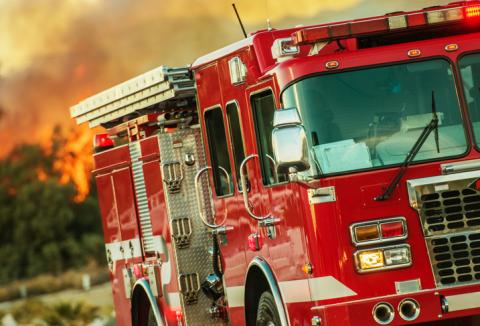Seniors More at Affected by Wildfires
As average temperatures rise and rainfall declines across the United States, wildfire season has become a regular—and longer-lasting—event. In some areas, the haze sets in for weeks, and residents see the sun only as an orange ball through the haze until rain comes. Large, dangerous fires are especially prevalent in forested areas, but also in wooded locations and grasslands. This year, we are already in the midst of major fires across the west, and the season is far from over.
The federal government spends close to $4 billion each year fighting these fires. Wildfires cause billions of dollars in property damage each year as well, and take many lives, including those of valiant wildland firefighters. Even people who are not in the path of the fires can suffer health consequences from breathing smoky air.
As with most natural disasters, seniors are disproportionately affected by wildfires. They are more likely to be trapped by a fast-moving fire. If your loved one lives in a high-risk area, they should have a plan to evacuate in case of fire. Help your loved one follow the instructions of local authorities to keep their home safe—for example, removing vegetation and brush around the house that could allow a fire to spread.
Public health experts have long studied the effects of the gases and fine particles from burning trees and brush. These gases contain ozone, carbon monoxide and dangerous fine particulate matter. Last year, researchers from the University of California, Davis noted that wildfire smoke often contains pesticides, as well as chemicals from fire-suppression efforts. Said study author Sarah Carratt, “When forests and farmlands catch fire, the chemicals applied to them burn, too, and potentially travel much longer distances than where they were first used.”
The Centers for Disease Control and Prevention (CDC) says this smoke is especially dangerous for seniors and others who have heart or lung diseases, such as COPD, congestive heart failure or asthma. In April 2018, the American Heart Association warned that “smoke exposure was associated with increased rates of emergency room visits, not just for breathing trouble, but also ischemic heart disease, irregular heart rhythm, heart failure, pulmonary embolism and stroke. The risk was greatest for adults age 65 and older.” They added, “In addition, long-term exposure to particulate matter can reduce life expectancy by a few years.”
The CDC offers suggestions for protecting elders from this hazardous smoke:
- Listen and watch for news or health warnings about smoke. Check your loved one’s local air quality reports. The community may provide reports about the U.S. Environmental Protection Agency’s Air Quality Index (AQI); you may also check on the AirNow.gov website.
- Keep indoor air as clean as possible. If your loved one is advised to stay indoors, keep windows and doors closed. Run an air conditioner, but keep the fresh-air intake closed and the filter clean to prevent outdoor smoke from getting inside.
- If your loved one does not have an air conditioner and it is too warm to stay inside with the windows closed, help them seek shelter in a designated evacuation center or away from the affected area.
- If your loved one has asthma or another lung disease, they should follow the advice of their doctor or other healthcare provider about their respiratory management plan. Call the doctor if your loved one’s symptoms worsen or they are having trouble breathing.
- Do not rely on dust masks for protection. Paper masks commonly found at hardware stores are designed to trap large particles, such as sawdust. These masks will not protect the lungs from the small particles found in wildfire smoke.
The CDC also reminds us not to contribute to poor air quality in the home by smoking, using the fireplace or even vacuuming, which can stir up small particulate matter that gets into the lungs.
By the way, wildfires aren’t the only source of dangerous smoke. Residents near the current volcanic activity in Hawaii should be aware that volcanic emissions also may worsen respiratory and heart symptoms for older adults.
